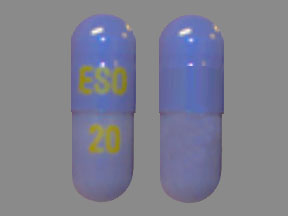
Eq Esomeprazole Magnesium Coupons & Savings Card – Discount Prices from $26.65
Brand for: Esomeprazole magnesium
My prescription
Edit
20MG, Esomeprazole Magnesium (90 Capsule Delayed Releases)
Select pharmacy

CVS
$31.56
COUPON PRICE
Walmart
$26.65
COUPON PRICE
Albertsons
$29.94
COUPON PRICE
Walgreens
$29.97
COUPON PRICEEq Esomeprazole Magnesium savings card
Show this card to your pharmacist
Walmart
$26.65
BIN
ID
PCN
GRP
019876
LH62ACA0D7
CHIPPO
LHX
Powered by
More prescriptions for heartburn
More prescriptions for heartburn
Eq Esomeprazole Magnesium (Esomeprazole Magnesium) dosage forms
Dosage Quantity Price from Per unit 20MG 90 Capsule Delayed Releases $26.65 $0.30 20MG 1 Capsule Delayed Release $2.70 $2.70 20MG 14 Capsule Delayed Releases $5.24 $0.37 20MG 20 Capsule Delayed Releases $6.42 $0.32 20MG 28 Capsule Delayed Releases $7.99 $0.28 20MG 30 Capsule Delayed Releases $8.38 $0.28 20MG 42 Capsule Delayed Releases $10.73 $0.26 20MG 60 Capsule Delayed Releases $14.26 $0.24 20MG 100 Capsule Delayed Releases $28.61 $0.29 20MG 1000 Capsule Delayed Releases $84.70 $0.09
| Dosage | Quantity | Price from | Per unit |
|---|---|---|---|
| 20MG | 90 Capsule Delayed Releases | $26.65 | $0.30 |
| 20MG | 1 Capsule Delayed Release | $2.70 | $2.70 |
| 20MG | 14 Capsule Delayed Releases | $5.24 | $0.37 |
| 20MG | 20 Capsule Delayed Releases | $6.42 | $0.32 |
| 20MG | 28 Capsule Delayed Releases | $7.99 | $0.28 |
| 20MG | 30 Capsule Delayed Releases | $8.38 | $0.28 |
| 20MG | 42 Capsule Delayed Releases | $10.73 | $0.26 |
| 20MG | 60 Capsule Delayed Releases | $14.26 | $0.24 |
| 20MG | 100 Capsule Delayed Releases | $28.61 | $0.29 |
| 20MG | 1000 Capsule Delayed Releases | $84.70 | $0.09 |
What are the side effects of taking esomeprazole magnesium?
Esomeprazole magnesium may cause several side effects. Common side effects include headache, diarrhea, nausea, flatulence, abdominal pain, constipation, and dry mouth. Less common but more serious side effects can include severe allergic reactions, liver problems, low magnesium levels, and an increased risk of bone fractures with long-term use. It is important to consult a healthcare provider if any severe or persistent side effects occur.
What should I avoid when taking esomeprazole?
When taking esomeprazole, one should avoid consuming alcohol, as it can increase stomach acid production and potentially worsen symptoms. Additionally, it is advisable to avoid taking nonsteroidal anti-inflammatory drugs (NSAIDs) like ibuprofen or aspirin unless directed by a healthcare provider, as these can irritate the stomach lining. It is also important to avoid eating large meals or foods that trigger acid reflux, such as spicy or fatty foods. Always follow the healthcare provider's instructions regarding diet and medication interactions.
What does esomeprazole do to your stomach?
Esomeprazole reduces the amount of acid produced in the stomach. It works by inhibiting the proton pump in the stomach lining, which decreases gastric acid secretion. This can help alleviate symptoms of acid reflux, gastroesophageal reflux disease (GERD), and other conditions related to excess stomach acid.
